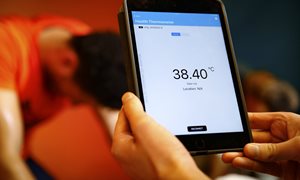 Dominique ten Haaf and colleagues performed a randomized clinical trial to assess the effects of 12-weeks protein supplementation on body characteristics. Daily supplementation of 30 grams of protein increased lean body mass and reduced fat mass. Findings were published in the Journal of Cachexia, Sarcopenia & Muscle.
Dominique ten Haaf and colleagues performed a randomized clinical trial to assess the effects of 12-weeks protein supplementation on body characteristics. Daily supplementation of 30 grams of protein increased lean body mass and reduced fat mass. Findings were published in the Journal of Cachexia, Sarcopenia & Muscle.
A total of 116 physically active older adults with insufficient protein intake and preparing for the Nijmegen Marches were recruited and allocated to daily protein supplementation or placebo. Measurements of body composition, muscle strength and physical performance were performed before the start and after 12 weeks of supplementation. Participants receiving proteins demonstrated a larger increase in relative lean body mass and larger reduction in fat mass during the study. No differences in muscle strength or physical performance were observed most likely because both groups already performed extremely well on these parameters at the initiation of the study.
Findings from the present study provide important insight in strategies to optimize the health benefits of a physically active lifestyle in older adults. Increasing or maintaining lean body mass is important as 0.5-1% of muscle mass is typically lost per year due to ageing. Preservation of muscle mass and muscle strength are important prerequisites to preserve mobility and independence for daily life activities while ageing.
Publication
Protein supplementation improves lean body mass in physically active older adults: a randomized placebo-controlled trial.
Ten Haaf DSM, Eijsvogels TMH, Bongers CCWG, Horstman AMH, Timmers S, de Groot LCPGM, Hopman MTE.
Dominique ten Haaf is member of theme Vascular damage.
Related news items

Grants for heart and kidney research Two awards to Radboudumc in Open Competition ENW-XS
21 July 2022Two researchers from the Radboudumc receive a grant from the NWO within the Open Competition of the Exact and Natural Sciences. They are Thijs Eijsvogels, who studies the heart, and Pieter Leermakers, who studies the kidneys.
go to page
Your heart rate as a thermometer Research Olympic athletes will be followed up during 4Daagse
18 July 2022Body temperature can be determined from heart rate. This is what research by the Radboudumc among Olympic athletes shows. Athletes can use this method during training to eventually perform better in the heat. The technique is now being further investigated among participants in the 4Daagse.
go to page
Young Investigator Award for Esmée Bakker
14 April 2022 Esmée Bakker received the Young Investigator Award for her abstract ‘Acute and long-term mortality rates among participants of mass-participation sports events versus the general population.’ go to page
Esmée Bakker obtained a Marie Skłodowska-Curie grant
29 March 2022 Esmée Bakker obtained a Marie Skłodowska-Curie European Postdoctoral Fellowships (160k) of the Horizon 2020 of the European Union. go to page
Exercise program appears to be a good alternative to surgery for chronic chest pain Reduced risk of other conditions, hospitalizations, and mortality
9 December 2021 Patients with chronic chest pain may benefit more from following an exercise program than from surgery in which doctors place a stent. Data from over 18,000 patients show a reduced risk of mortality, hospitalizations and other conditions. go to page